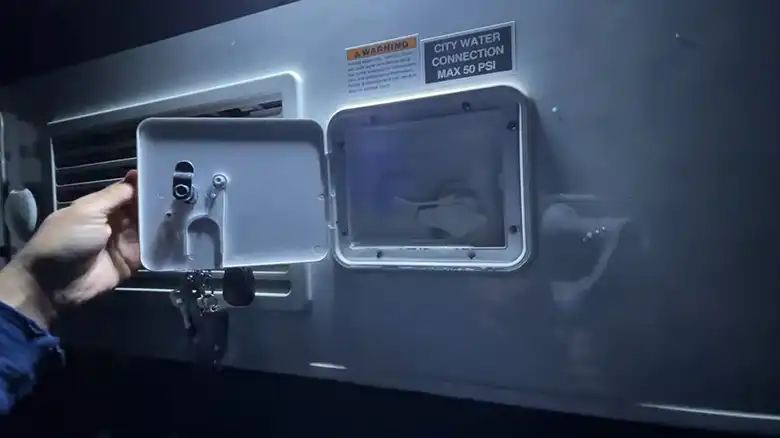RVing adventures don’t have to end when the mercury drops and snow starts falling. But freezing nights require special preparation to avoid devastating winter plumbing damage. The last thing any RVer wants to wake up to is a burst pipe or ice-encrusted holding tank! Avoiding expensive repairs means using antifreeze formulated to handle frigid conditions. However, antifreeze doesn’t protect indefinitely. Its performance and freeze resistance diminish over time.
So how long does RV antifreeze remain effective before turning useless? Basically, it ranges from a few months to 5 years. And what factors determine whether antifreeze lasts a few months or many years? Keep reading to know the details. This complete guide shares expert insights to help RV owners understand antifreeze lifespan, catch expiration signs early, and maximize the longevity of this essential fluid. So, without wasting much time, let’s begin!

Types of RV Antifreeze: What You Need to Know
Antifreeze, added to plumbing systems, keeps pipes and tanks from bursting and components from cracking in frigid temperatures.

Source: rvblogger
The most common antifreeze products used are –
Propylene glycol formulas: Non-toxic and relatively eco-friendly, this RV-specific antifreeze provides burst protection down to -60°F when concentrated. Branded options include Camco Pink RV Antifreeze.
Non-toxic antifreeze: Made from propylene glycol with corrosion inhibitors, these are safe for pipes, valves, seals, and food-grade surfaces. Peak and Happy Campers Organic are leading choices.
FDA-approved, food-grade antifreeze: For drinking water systems, an approved formula like Splash RV Antifreeze must be used to avoid toxicity.
Now let’s explore what dictates how long these various RV antifreeze products remain effective before their freeze protection disappears.
Key Factors That Impact Antifreeze Longevity
From storage conditions to formula integrity, many variables influence opened and unopened RV antifreeze’s lifespan.
The Difference Between Sealed and Opened Containers
Unopened antifreeze in a factory-sealed container, stored properly, can last up to 5 years from the production date before quality degrades. But once opened and exposed to air, its lifespan decreases significantly.
Opened antifreeze lasts just 1-2 seasons when used properly in RV plumbing. Dilution, contamination, and oxidization reduce duration. Only keep previously used antifreeze for emergencies.
How Storage Conditions Affect Antifreeze Lifespan
Antifreeze lasts longest when stored sealed at a moderately stable temperature, between 40°F to 80°F. Hot or freezing temperatures fasten chemical breakdown. Keep it indoors or temperature-controlled.
Avoid storing antifreeze containers directly on cement or dirt floors which can wick away coolant. Elevate on shelving or pallets. Excess light exposure from sunlight also degrades antifreeze over time. Use opaque containers or keep them in the dark.
The Role of Formula Quality and Ingredients in Antifreeze Duration
Higher purity formulas with more propylene glycol and fewer contaminants have greater longevity. Renowned brands like Camco and Peak also perform more rigorous quality control and use additives to extend shelf life.
Bargain antifreeze may be adulterated or rely on older ethylene glycol formulas. Check that any generic brand uses propylene glycol and has necessary corrosion inhibitors.
Usage and Maintenance Tips to Extend Antifreeze Life
How you deploy antifreeze affects duration too. Diluting with too much water reduces freeze protection. Letting RV systems sit stagnant hastens oxidation. Use antifreeze manufacturer-recommended ratios.
Regularly flushing and replacing old antifreeze improves longevity. Address any system leaks that could expose antifreeze to air. Keeping fluids moving helps. Proper storage and maintenance optimize lifespan.
How to Identify Signs of Expired or Ineffective Antifreeze?
Monitoring your vehicle’s antifreeze for signs of expiration is crucial for maintaining optimal engine performance and preventing potential damage. While antifreeze doesn’t come with a clear expiration date, several indicators can help you identify when it’s losing its effectiveness.
One of the key indicators is changes in viscosity. Over time, antifreeze may either thin out or thicken to a syrup-like consistency, signaling a decline in its ability to protect your engine. Regularly inspecting the fluid for such alterations can provide valuable insights into the overall health of your coolant.
Another visual cue is cloudiness or the presence of debris in the antifreeze. Normally, antifreeze is a transparent pink fluid, and any deviation from this clarity suggests contamination and degradation. The appearance of particles serves as a red flag, prompting you to take action before potential issues arise.
Additionally, pay attention to the odor of the antifreeze. When fresh, it typically has a pungent scent that diminishes over time as the chemical inhibitors within the coolant break down. Loss of this characteristic odor is an additional signal that your antifreeze may be reaching the end of its effective lifespan.
To accurately assess the condition of your antifreeze, compare its appearance against new products. Any noticeable deviations should prompt further investigation. For precise results, consider using a refractometer to test the antifreeze freeze point. This tool enables you to measure the concentration of antifreeze and water in the mixture, providing a clear indication of its performance.
Regularly monitoring these indicators and promptly addressing any signs of expiration will help ensure that your vehicle’s cooling system continues to function optimally, providing reliable protection against extreme temperatures and potential engine damage.
Recommended Lifespan for Different Types of RV Antifreeze
Knowing the recommended lifespans of antifreeze is essential for maintaining the efficiency and safety of your RV’s systems. Drawing from my extensive experience in winterizing numerous RVs, I offer the following guidelines –
Sealed Antifreeze Containers
Sealed antifreeze containers boast a shelf life of 3 to 5 years when stored under proper conditions in moderate environments. Ensuring that the containers remain sealed and protected from extreme temperatures contributes to their longevity.
Opened Antifreeze for Seasonal RV Winterization
For opened antifreeze used in typical seasonal RV winterization, the recommended lifespan is 1 to 2 years. The actual duration depends on factors such as the purity of the antifreeze and its dilution levels during use. Regular checks and considerations of these factors will help you gauge the effectiveness of the antifreeze over time.
Opened Antifreeze for Infrequent RV Use
In cases of infrequent RV use, opened antifreeze may extend its lifespan to 2 to 4 years. However, this assumes that RV systems are thoroughly flushed and re-treated at the beginning of each season. This proactive approach ensures the continued efficacy of the antifreeze.
Food-grade antifreeze in Drinking Water Plumbing
When using antifreeze in drinking water plumbing, opt for food-grade antifreeze and replace it annually to uphold health safety standards. Regular replacement helps mitigate any potential risks associated with long-term exposure.
NOTE: Generalized Lifespan Estimates for Specific Antifreeze Types –
Propylene Glycol Antifreeze: 3 to 5 years when sealed, 1 to 2 years when opened.
Food Grade Antifreeze: Maximum lifespan of 1 year.
Ethylene Glycol Antifreeze: 2 to 3 years when sealed, 6 to 12 months when opened.
Tips for Maximizing the Longevity of Your Antifreeze
You can optimize RV antifreeze lifespan by –
- Storing sealed containers properly in a moderate, stable temperature away from extreme cold or heat.
- Selecting high-quality propylene glycol antifreeze from leading brands. Match formula to system type.
- Using manufacturer-recommended antifreeze ratios and water dilution levels.
- Flushing old antifreeze from systems annually and replacing it with fresh products.
- Addressing any leaks or stagnant fluid issues in plumbing to avoid contamination.
- Checking for signs of antifreeze expiration regularly like viscosity, clarity, and odor changes.
With proper storage, RV system maintenance, and monitoring for degradation, you can maximize the lifespan of your antifreeze investment.
Commonly Asked Questions About RV Antifreeze
Does RV antifreeze expire or just become less effective?
RV antifreeze does not have a definite expiration date, but its freeze protection will degrade over time as ingredients break down. Check aged fluid for signs of diminished performance.
Can I reuse leftover antifreeze from winterizing my RV?
Only reuse the previous season’s antifreeze in an emergency, not for regular winterization. Flush systems and replace antifreeze annually for best results.
How long does RV antifreeze last in drinking water plumbing?
For RV drinking water lines, always use FDA food-grade approved antifreeze and replace it every year for health safety.
The Bottom Line for RV Owners
Knowing your RV antifreeze’s lifespan guidelines helps avoid frozen disasters on chilly trips. While sealed jugs can last for years, opened antifreeze degrades more rapidly. By selecting quality formulas, storing them properly, and maintaining plumbing systems, you can winterize with confidence using long-lasting antifreeze protection. Monitor your antifreeze over time and replace depleted quantities every 1-2 seasons. Investing in fresh antifreeze and proper winter care saves money and headaches down the road. Keep enjoying winter adventures with an RV prepped to handle old man winter’s worst!



Нужно собрать данные о человеке ? Этот бот поможет детальный отчет мгновенно.
Воспользуйтесь продвинутые инструменты для анализа цифровых следов в открытых источниках.
Выясните контактные данные или активность через систему мониторинга с верификацией результатов.
пробить через глаз бога
Система функционирует с соблюдением GDPR, обрабатывая открытые данные .
Закажите детализированную выжимку с историей аккаунтов и графиками активности .
Попробуйте проверенному решению для исследований — результаты вас удивят !
Your comment is awaiting moderation.